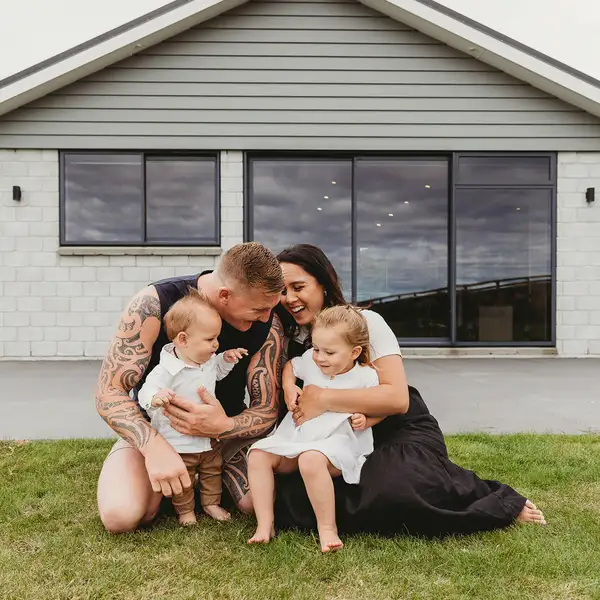This is a different way to buy a home
-
Combine savings with friends or family to achieve the deposit goal faster, getting you all on the property ladder sooner.
-
Provides the ability to share ongoing property related expenses such as home maintenance, rates and insurance.
-
Together you may be able to borrow the amount that's needed to buy the property you're all after.
How it works
-
Who can Co-own?
Teaming up looks different for everyone. For example, you could borrow together with a group of friends, with siblings, or be a couple teaming up with another couple. Everyone needs to be on the same page, trust one another, and be comfortable that their personal information will be shared with each other.
Co-ownership won't suit everybody, and is not for business purposes.
-
A property sharing agreement
We strongly recommend all co-owners have a property sharing agreement in place before the property is purchased. A property sharing agreement sets out each co-owner's rights and obligations in relation to the property and helps ensure all co-owners are aligned and in agreement. It may also help bring to light potential issues, before you get too far down the track.
-
How does the home loan work?
At Kiwibank, it's common in Co-own arrangements to have a joint home loan structure where all co-owners are borrowers. For joint home loans, you're still each individually and together liable for the entire home loan. As a team, you'll decide how the loan is structured, for example it could be split into portions with different loan amounts and repayment terms. Read more about structuring your home loan. Offset home loans may not be available for Co-own arrangements.
-
The deposit
If at least one of the co-owners will be living in the property, then generally a combined deposit of 20% of the purchase price is required. This can be made up of savings or borrowing against available equity in an existing property if the home loan is with us.
-
Making changes to your home loan
For simple home loan maintenance requests, like changing the regular payment amount or repayment date, we only need one of you to tell us – but it’s important that you’re all across any changes beforehand. To apply for additional borrowing, we'll need all co-owners' consent. If you or any of the other co-owners are going through financial hardship please get in touch with us.
Steps to help you on your Co-own journey
-
1Tahi
Choose your co-owners
You'll want to make sure you know and trust each person you're teaming up with, and are comfortable with sharing your personal information with them. It's important to discuss each person's goals, and agree on short and long term plans for the property. You also need to be aware of the risks of borrowing and owning a property with others.
-
2Rua
What's affordable?
You'll all need to be aware of how much each person may be able to contribute towards the deposit, home loan repayments and property-related expenses. Once you're all on the same page, get in touch with a home loan specialist to understand how much you may be able to borrow together.
-
3Toru
Who else can help?
It's important everyone thinks about what borrowing and owning property with each other may mean for them. Reaching out to a lawyer and/or a financial tax adviser, like an accountant or tax consultant, may help outline the risks and considerations. While you each decide who could provide independent legal and tax advice, get in touch with a home loan specialist to talk through the home loan application process.
-
4Whā
Apply for conditional approval
Conditional approval gives you an idea of how much, as a group, you may be able to borrow. A home loan specialist can help guide you through the application process. You'll all need to be comfortable sharing personal information with each other, and provide us with documents like proof of income, bank statements and identification.
-
5Rima
Set up a property sharing agreement
Engage with a lawyer to create a property sharing agreement between all co-owners. The agreement sets out the co-owners' rights and obligations in relation to the property. We recommend independent legal advice is obtained before signing the agreement. There will be an additional cost for this advice and the preparation of the agreement, however it's worthwhile to help prevent future disputes. The property sharing agreement is between all co-owners and doesn't include Kiwibank, therefore Kiwibank isn't bound by anything in the agreement.
-
6Ono
Make an offer
When you and the other co-owners have found a property, share the detail with your home loan specialist. They'll confirm the loan amount and outline any conditions that will need to be met before we can provide an unconditional offer of finance. The conveyancing lawyer should check the sale and purchase agreement before it's signed. Read more about what happens after settlement.
Some things to think about
Some things to consider independently before deciding whether co-owning a home with friends or whānau might suit you. There are risks involved in co-ownership and it's an important decision that should be carefully thought out.
- Buying a home with friends or family can be very exciting. However, it's not without its challenges and risks that could put stress on any relationship. It's important you discuss possible scenarios with the other co-owners and expectations are shared openly. Having those challenging conversations upfront can help ensure you're all on the same page before commencing the Co-own journey.
- While teaming up with others may be a way to help you get on the property ladder sooner, it's important to explore other options available to help you make the right decision. For example, if eligible, you may prefer a low deposit home loan. Read more about how KiwiSaver can be used to help you reach your deposit goals .
- Your lawyer is the best person to explain the risks associated with co-ownership, and advise you on different ownership structures and what to include in a property sharing agreement. It may also be a good time to review your Will.
- For a joint home loan, even if you only own a share in the property, you'll still be liable for the entire home loan. This means if one co-owner can't pay their share of the loan repayments, then the other co-owners must cover the shortfall. Any defaulted home loan payments may adversely impact all co-owners' credit ratings.
- If you're liable for the entire home loan, this may impact your ability to borrow more debt in your own name.
- As you'll be taking on new debt and co-owning with others, you should each consider Life & Living Insurance.
Real Co-own scenarios
Our On the Ladder TV series showcases real-life examples of Kiwi teaming up to co-own a property. Read some of their stories here.

Couple and friend balance lifestyle and investment
Married couple Beth and Reuben and their friend Grace initially joked about the idea of buying together, but they quickly started to see value in the idea. They explore co-ownership to lessen their debt and maintain work life balance.

Mother and son secure their futures
A desire to see her son set up with life-long security is at the heart of Te Rōpu's search for a whare. Leveraging Te Rōpu's existing property investments and Katene's KiwiSaver, they hope that they can find their own special place.

Two couples join forces to get on the ladder
Architect Jihwan is keen to purchase a home but he and partner Rosie can't afford one alone. Long-time friends Tom and Dahee have agreed to join forces and buy a property together.

Three 23-year old mates get ahead
Mates Saxon, Matt and Ryan are high achievers in sport, career and they hope soon... property! Though only 23, they're motivated to get on the ladder as soon as possible to build a solid foundation for their future financial security.

Couple buys together to live separately
Couple Paula and Gordon share their inspiring journey to establish a unique modern living arrangement that defies tradition, but works for their relationship, desire for independence, and differing lifestyles.

Long-term friends team up to buy a home
Ben and Ciaran have a friendship strong enough to move to the next stage - owning a house! Ciaran is an architect and both are handy on the tools, so their dream is to buy a project they can make their own.
Start your Co-own journey
Talk to one of our home loan specialists to see if Co-own is an option for you.
Talk to a specialist
Our home loan specialists can walk you through the process of buying a home and discuss what your options are.
Find a specialistHow to apply
Have a look at how the home loan application process will go and what you'll need before you apply.
Find out moreTips & guides to help you get into your home

Guide to buying your first home
If this is your first property, check out our first home buyer guide for everything you need to know about house hunting, putting in an offer, and settlement.

Using your KiwiSaver
If you've been in KiwiSaver for at least three years and you meet the eligibility requirements, you may be able to make a first home withdrawal to go towards buying your first home.
Download our Co-own how-to guide for more information.
Home loan standard terms and conditions
Displayed interest rates are subject to change. Kiwibank’s lending criteria, terms and conditions, and fees apply.
Co-own: Maximum four people per application. Offset home loan may not be available. Excludes business banking.
Co-own: customer case studies are summaries based on real-life scenarios to help demonstrate how Co-own could work. They are for information purposes only, and don't detail all the risks and considerations that need to be considered when entering into a Co-own arrangement.
This page provides general information and isn't intended as regulated financial advice. If you'd like us to review your specific situation, please contact one of our home loan specialists.
Retail products aren't available to financial institutions or wholesale customers.
